Posts in Category: BORIS2


Final Conference: Large Appreciation for BORIS2’s Results
On December 11, 2025, the BORIS2 project held its final conference in Pavia, Italy, presenting its results and discussing how to make use of them in the future, i.e., how the BORIS2 methodology and platform can be used to support cross-border disaster preparedness for floods and earthquakes. The event (hosted by EUCENTRE) gathered the project team and external stakeholders from all over Europe. It was a great opportunity to showcase the project’s outputs to its stakeholders and end-users.

Setting the scene
After welcomes from Michele Lissia (Mayor of Pavia), Fabio Germagnoli (EUCENTRE), and Mauro Dolce (Consorzio Interuniversitario ReLUIS), Cristina Colaco (DG ECHO) spoke about capacity building tools for preparedness, and Azzurra Lentini (Joint Research Centre) spoke about the importance of building on science evidence to support disaster management. BORIS2 coordinator Maria Polese (CI3R) and Johanna Zweiger (DCNA) presented the overall objectives and dissemination efforts of the project.

Methodology, tools and pilots
Daria Ottonelli (CI3R) and Secer Keskin (TED University) explained challenges and gaps, e.g., regarding data collection, and Matjaz Dolsek (University of Ljubljana) presented the BORIS2 methodology (four steps for a harmonized framework for urban multi-risk assessment). This was followed by a presentation by Serena Cattari (CI3R) who explained how the project worked on overcoming its challenges and on practically applying the methodology. Valerio Poggi (OGS), René Kastner (DCNA), and Milena Ostojić (University of Montenegro) illustrated the three pilot applications for verifying the replicability, robustness, and practical usefulness of the approach. Finally, Marta Faravelli (CI3R) presented the new BORIS2 platform which integrates the project’s methodological results and their application in the pilot areas.
The way forward
The day ended with a roundtable discussion moderated by Mauro Dolce that included invited stakeholders from several European countries (Austria, Slovenia, Montenegro, Turkey, and Italy). The discussion highlighted the added value of a harmonised approach to multi-hazard risk assessment and the importance of cross-border cooperation, especially in areas characterised by shared infrastructure or natural phenomena with supranational dynamics.
The contributions that emerged underlined how BORIS2 represents a significant step towards more effective tools to support strategic decisions in emergency planning. The possibility of applying the methodology at the sub-municipal scale, together with the integration of critical infrastructure and multi-hazard assessment, enables more precise identification of the most vulnerable urban areas and operational priorities.
A big thank you to our hosts from EUCENTRE and all participants for joining!
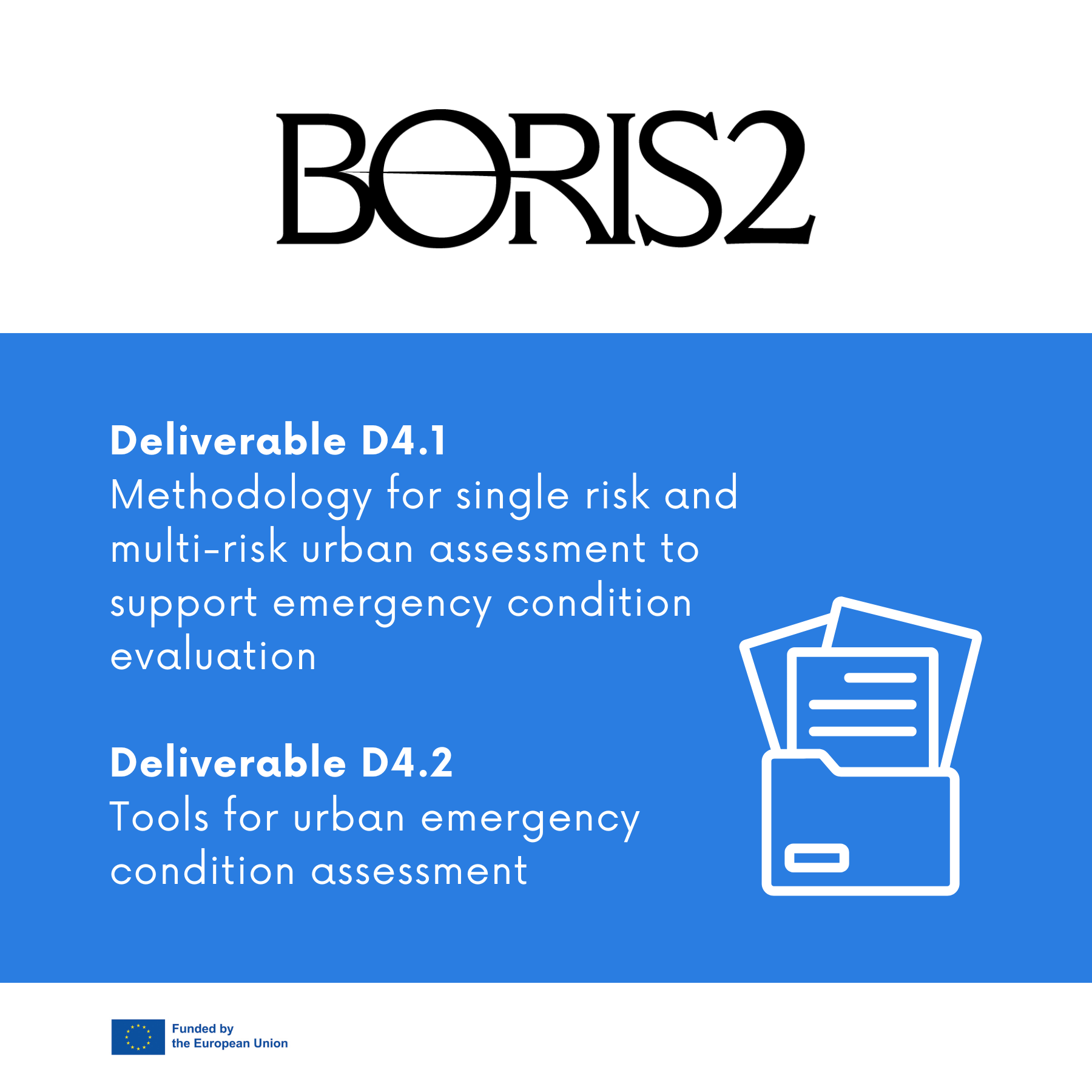
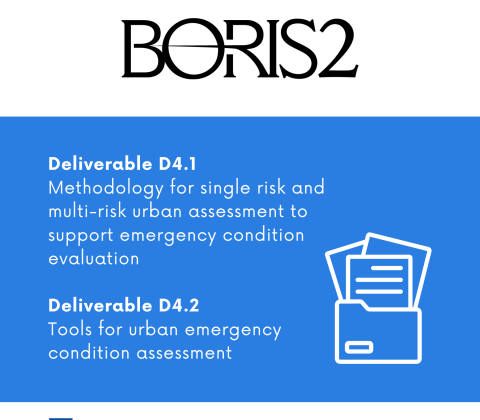
New Deliverables Available: Methodology & Tools for Emergency Condition Assessment
The BORIS2 team is happy to share more results developed within the project, i.e., two deliverables that are now publicly available on the project website and the UCPKN platform:
𝐌𝐞𝐭𝐡𝐨𝐝𝐨𝐥𝐨𝐠𝐲 𝐟𝐨𝐫 𝐬𝐢𝐧𝐠𝐥𝐞 𝐫𝐢𝐬𝐤 𝐚𝐧𝐝 𝐦𝐮𝐥𝐭𝐢-𝐫𝐢𝐬𝐤 𝐮𝐫𝐛𝐚𝐧 𝐚𝐬𝐬𝐞𝐬𝐬𝐦𝐞𝐧𝐭 𝐭𝐨 𝐬𝐮𝐩𝐩𝐨𝐫𝐭 𝐞𝐦𝐞𝐫𝐠𝐞𝐧𝐜𝐲 𝐜𝐨𝐧𝐝𝐢𝐭𝐢𝐨𝐧 𝐞𝐯𝐚𝐥𝐮𝐚𝐭𝐢𝐨𝐧
D4.1 presents the BORIS2 methodology developed to support cross-border emergency management planning through scenario-based loss estimation at the affected area and performance assessment of Emergency Management Systems (EMS) limited to the municipal level. The methodology adopts a multi-step approach aimed at simulating earthquake, flood, and compound (earthquake and flood) hazard scenarios, estimating their impacts on residential buildings, and evaluating the emergency response capacities.
𝐓𝐨𝐨𝐥𝐬 𝐟𝐨𝐫 𝐮𝐫𝐛𝐚𝐧 𝐞𝐦𝐞𝐫𝐠𝐞𝐧𝐜𝐲 𝐜𝐨𝐧𝐝𝐢𝐭𝐢𝐨𝐧 𝐚𝐬𝐬𝐞𝐬𝐬𝐦𝐞𝐧𝐭
D4.2 presents a review of existing tools to compute and visualize risk and losses for seismic and flood risks, a review of the Limit Condition for Emergency (LCE) concept and its evaluation model together with the existing applications, as well as a review of the tools for the evaluation of emergency system components together with the existing applications. The knowledge compiled within this deliverable is used for developing shared methodologies for seismic, flood and multi-risk assessments to support emergency condition evaluation.
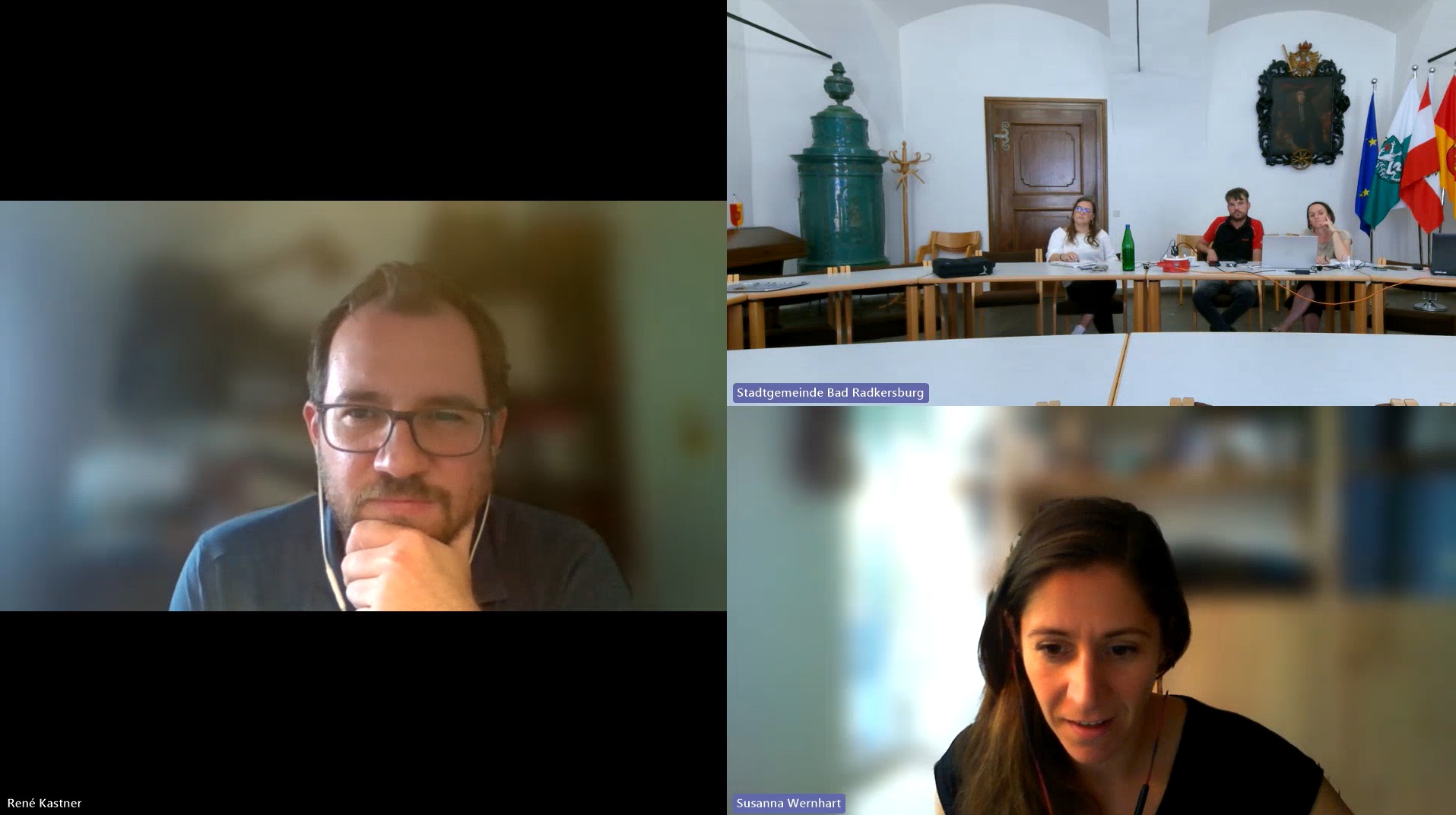
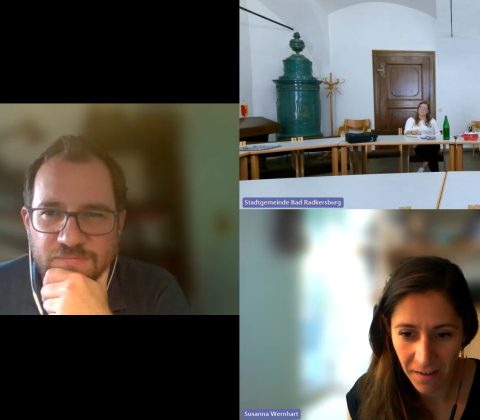
BORIS2 Pilot Activities & EMS Data Collection
The methodology developed within the BORIS2 project is now being applied in multi-country and cross-border pilot applications to be demonstrated via the web-platform. This will allow to evaluate alternative seismic, flood or multi-risk scenarios and to visualize maps for dissemination of results. For these pilot activities, EMS (Emergency Management System) data has been collected to learn what kind of data the municipalities have when it comes to civil protection. Several lists of EMS units are now being prepared for the pilot areas:
✅ Pilot 1 – Italy-Slovenia border (Gorizia/Nova Gorica):
In Italy, OGS was in touch with the Civil Protection Department of the Friuli Venezia Giulia Region. In Slovenia, the University of Ljubljana (UL) has been in contact with representatives for civil protection from Nova Gorica. The representatives helped with obtaining the data that are not publicly available, such as where the gathering areas in the municipalities are, and how many fire and rescue vehicles are available for rescue, etc.
✅ Pilot 2 – Austria-Slovenia border (Bad Radkersburg/Gornja Radgona):
Like for Pilot 1, UL is currently preparing the list of EMS units in Gornja Radgona. In Austria, Disaster Competence Network Austria has been in touch with representatives from the municipality of Bad Radkersburg. In an online meeting (pictured below), the BORIS2 project and its pilot activities were presented, and the group took a closer look on the EMS units data that is available in the municipality and how different datasets could be merged.
✅ Pilot 3 – Montenegro:
For Pilot 3, the University of Montenegro conducted field visits to Berane. During the first visit, key infrastructure buildings part of the local EMS were mapped. The team visited selected buildings to verify their location and condition (e.g., a football stadium & a sports hall – pictured below), collected GPS coordinates and basic descriptive data, and developed a geospatial dataset.
The second visit involved a meeting at the municipality of Berane where BORIS2 and its objectives were presented. The municipality team committed to assisting in the completion of the EMS dataset and facilitating access to available documentation.
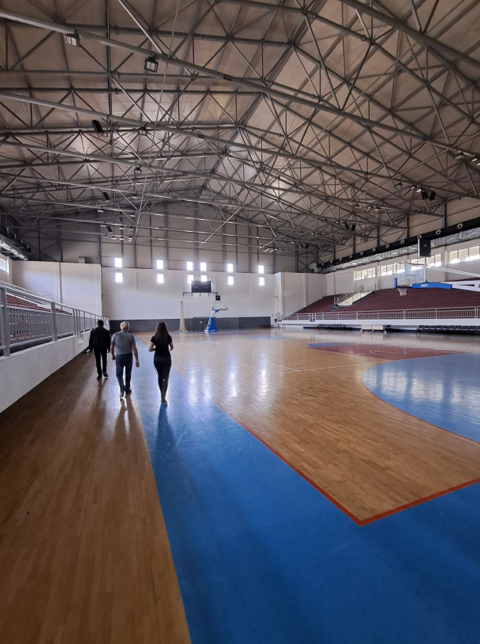
Thanks to Aldo Primiero, Gabriele Peressi, Andrej Biaggio, Vesna Susič, Janja Osojnik, Daniela Leopold-Sommer, Bettina Wallner, Philipp Drexler, Rebekka Holler, Maja Djurisic, Milutin Micovic and Miljan Ralevic for your support!


New deliverable: D2.2 Data availability and needs for urban-scale emergency management, obstactles and solution
We’re proud to announce that a new deliverable is available for free download on our UCPKN page. The newly released D2.2 “Data availability and needs for urban-scale emergency management, obstacles and solution” from work package 2 of the BORIS2 project, funded by the European Commission (DG ECHO), addresses this key challenge. It builds on earlier work mapping existing methodologies in partner countries and now focuses on two critical questions:
How do seismic and flood risk differ and how can we align methodologies to ensure consistency?
What differences exist in data and emergency procedures between countries and how can we bridge them?
By comparing hazard, vulnerability, and exposure models for critical infrastructure and emergency processes, this work identifies necessary data, gaps, and potential solutions to improve preparedness and response.

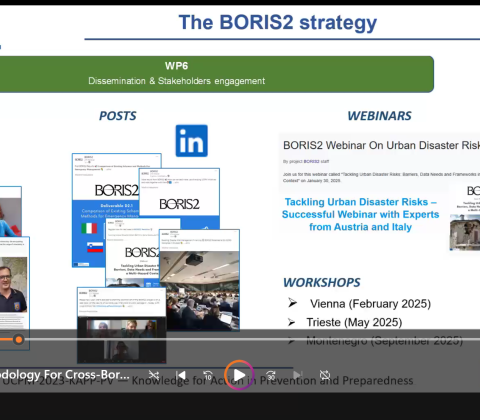
Re-watch the BORIS2 webinar from June 12, 2025
The BORIS2 team was excited to welcome more than 40 participants to last week’s webinar ‘Methodology for Cross-Border Emergency Management Planning’. Thanks to everyone interested in the event, for asking questions and to our speakers Maria Polese, Matjaz Dolsek, Radmila Salic Makreska and Mojca Premrl – for sharing insights into the project and other initiatives that deal with cross-border collaboration in the field of crisis management!
In case you missed it, you can find the recording of the webinar here:

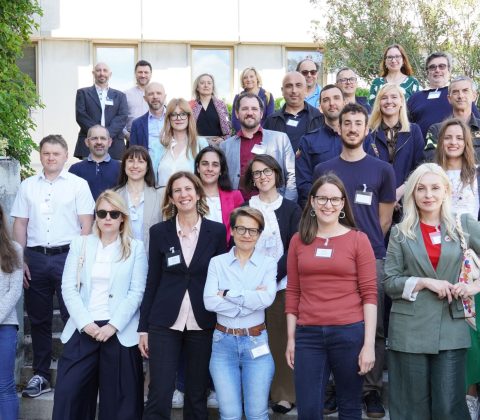
Workshop on multi-risk assessment in cross-border areas in Trieste
After the first stakeholder workshop in Vienna in late February, the BORIS2 team concluded another two-day stakeholder workshop yesterday. This time, the event took place in Trieste and was hosted by OGS, presenting results achieved so far and planning the last quarter of the project. The workshop brought together not only the project partners but also external experts and end-users who shared their experiences and provided feedback regarding the BORIS system.
The event started with an introduction by Valerio Poggi (OGS) and project coordinator Maria Polese (CI3R) as well as a summary by Matjaž Dolšek (University of Ljubljana) on the challenges and solutions identified in terms of the BORIS2 methodology (which is also the topic of the next BORIS2 webinar on June 12). Marta Faravelli and Davide Quaroni (EUCENTRE), then, presented the prototype of the BORIS2 platform. This was followed by insightful presentations from
💡 Mojca Premrl – who talked about the Interreg project IN4SAFETY focused on joint emergency action plans
💡 Aldo Primiero (Friuli Venezia Giulia Civil Protection) – who provided the perspective of regional civil protection organizations, esp. regarding seismic risks
💡 Alessandro Gallo (coordinator of volunteers, Comune di Gorizia) – who shared challenges often faced by municipalities when responding to earthquakes
💡 Mihelj Borut (Nova Gorica fire brigade) – who talked about possible solutions for first responders who deal with the many unknowns in disasters.
Of course, there were extensive discussions, also on the remaining tasks of the project. There was also some time for informal networking and visiting beautiful Miramare Castle close to the workshop location.
“Grazie mille” to everyone who contributed to this event!













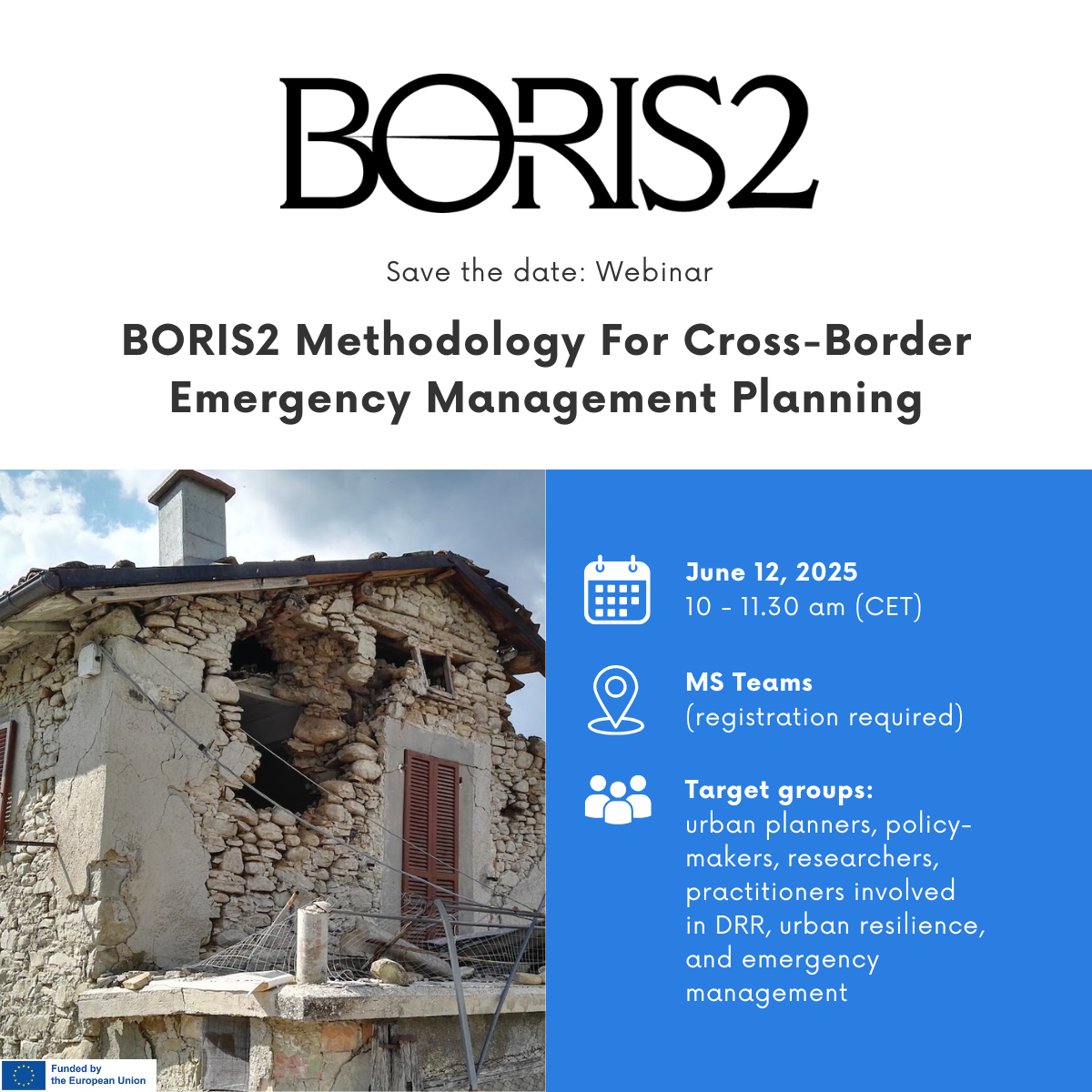

Webinar: BORIS2 Methodology For Cross-Border Emergency Management Planning
12.06.2025
10:00-11:30 am (CET)
Disasters don’t stop at borders. Cross-border regions can use the joint assessment of risks as a chance to strengthen cooperation, integrate expertise from various disciplines, and foster a deeper mutual understanding. Harmonisation in this context means aligning methods, perspectives, and data to assess and address both single and multiple risks in a coordinated manner.
What are the key differences between deterministic and probabilistic risk assessments and when should each be used? The team behind the DG ECHO-funded project BORIS2 is ready to provide answers.
This webinar will present the framework and multi-step methodology for multi-risk assessment developed in BORIS2. Based on identified needs, stakeholder input and defined objectives, the framework delivers a harmonized approach for assessing both single and multiple risks in urban areas. It also introduces a method to evaluate the efficiency of urban emergency systems, supporting more effective emergency planning in the preparedness phase. The framework will serve as the basis for the upcoming cross-border pilot applications which will be presented during this webinar as well.
Goals of the webinar
- Initiate discussions of best practises
- Get new insights from participants
- Networking
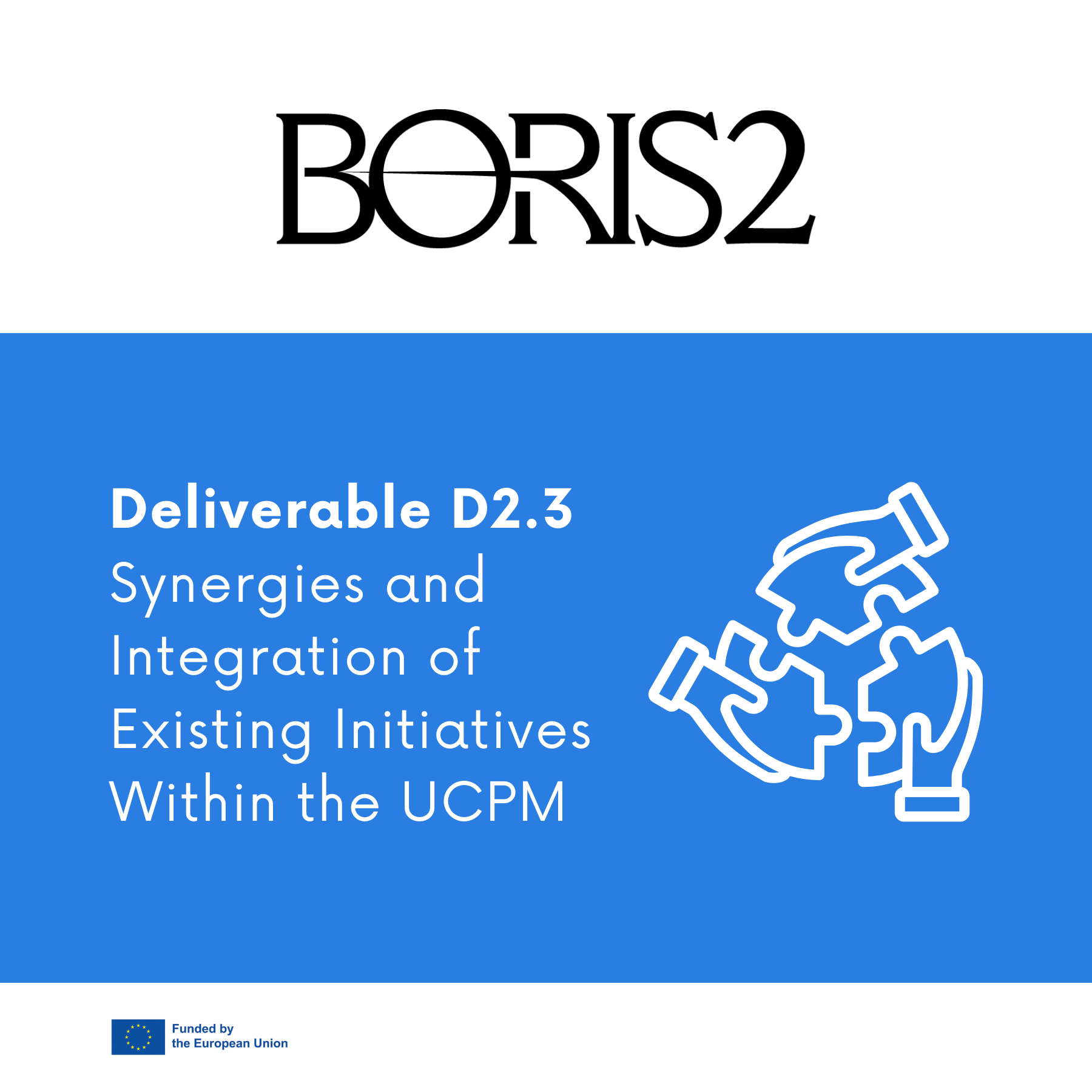
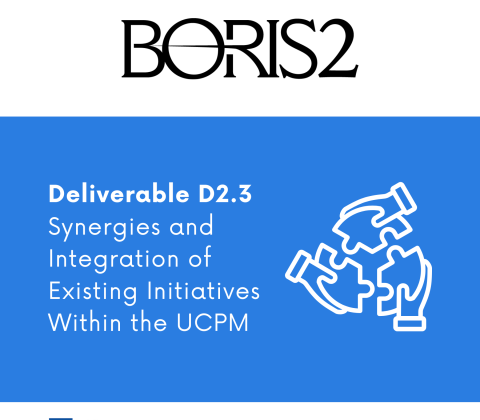
More BORIS2 Results: Synergies and Integration of Existing Initiatives Within the UCPM
We are happy to share more results from our project: Deliverable D2.3 (Synergies and Integration of Existing Initiatives Within the UCPM) aims to investigate, identify and utilise synergies between the BORIS2 project and existing Union Civil Protection Mechanism initiatives. By considering the results of these initiatives, BORIS2 seeks to improve its methodologies, tools and frameworks for DRM, particularly for cross-border and multi-risk assessments. This report shows how existing projects and networks contribute to BORIS2 activities and promote a coherent approach to disaster resilience and emergency planning across Europe.
The report features a comprehensive review of past and current EU and UCPM-funded projects. This review includes a detailed examination of the objectives, outcomes and methodologies of these projects to identify overlapping objectives and complementary approaches. Understanding these initiatives allows us to identify approaches and outcomes that may be relevant to BORIS2. An important part of this process is the identification of common methods and tools used in these initiatives.
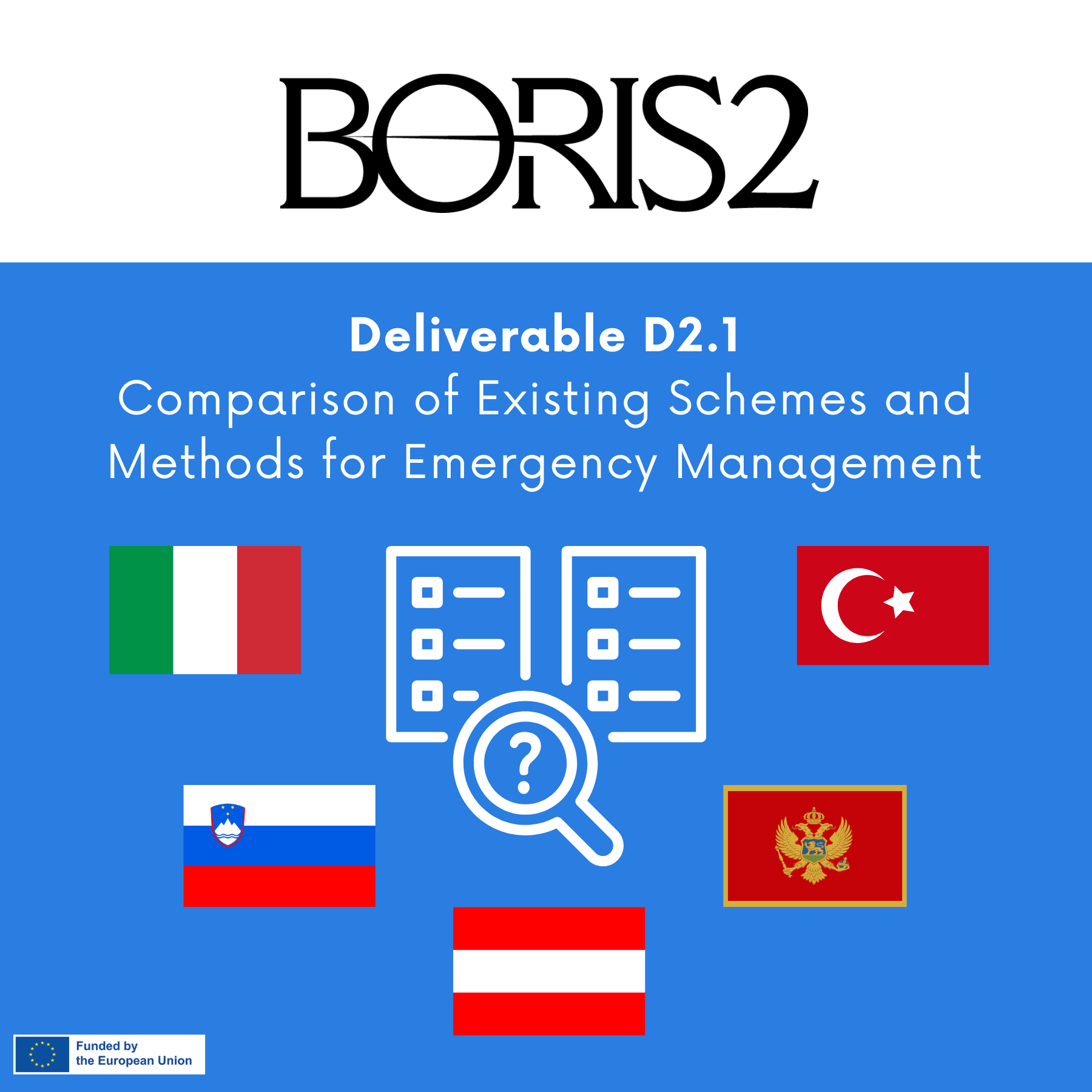
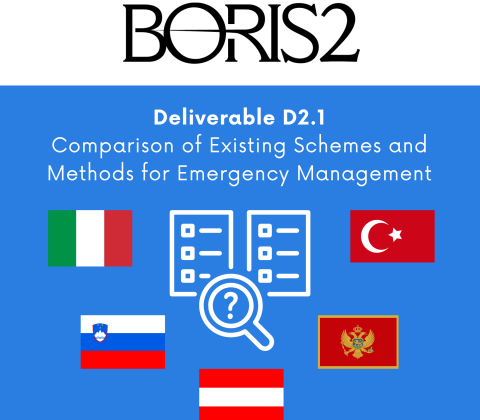
First BORIS2 Results: D2.1 – Comparison of Existing Schemes and Methods For Emergency Management
We are happy to share the first results of the BORIS2 project! You can now access the full version of deliverable D2.1 – Comparison of Existing Schemes and Methods For Emergency Management. This deliverable originates from work package 2 of the project (Context Analysis and Needs Assessment), and provides a comprehensive analysis of existing seismic and flood risk assessment methodologies from an effective disaster risk management (DRM) perspective at the urban level. It also aims to review and evaluate the diverse DRM frameworks, decision making processes, and legal and institutional arrangements adopted by different countries, highlighting areas for potential alignment.
The core of D2.1 is an extensive analysis of DRM practices across Italy, Slovenia, Austria, Turkey, and Montenegro. Each country exhibits unique methodologies tailored to their specific environmental and urban challenges, reflecting diverse approaches to seismic and flood risk management at an urban scale. Each section is divided into sub-sections that cover the hazards, vulnerabilities, exposure levels, damage and impact indicators and tools (platform) for risk assessment related the respective risks. Special attention is given to the role of seismic and flood risk analysis in effective DRM as well as multi-risk assessment methods at urban scale.
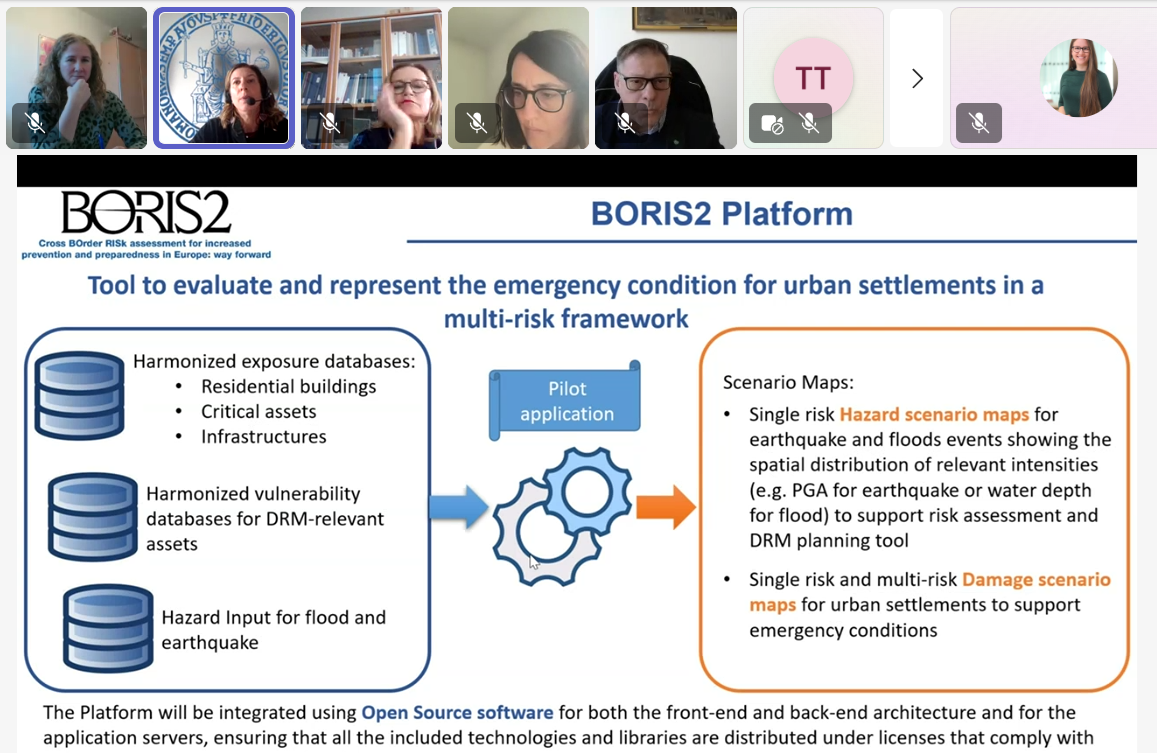

Tackling Urban Disaster Risks – Successful Webinar with Experts from Austria and Italy
We were pleased to welcome more than 60 participants to today’s webinar on “Tackling Urban Disaster Risks: Barriers, Data Needs, and Frameworks in a Multi-Hazard Context”, organized by the Disaster Competence Network Austria. The webinar provided inputs from experts from Austria and Italy, and attracted participants from universities, research institutes, civil protection deparments and other organizations involved in cross-border-collaboration from all over Europe and beyond.
As part of the BORIS2 team, Maria Polese and Daria Ottonelli presented the project and the findings of work package 2 – context analysis and needs assessment. Our external speakers, then, provided practical inputs from their everyday work: Tanja Schriebl and Günter Hohenberger from the Office of the State Government of Styria, Austria, talked about the contingency plan for floods for the border (river) Mur and Elena Speranza from the Italian Civil Protection Department presented an overview on emergency planning and Italian civil protection tools.
Curious about the insights presented in the webinar? You can re-watch it here:
Find out more about the speakers of the webinar:
Maria Polese is associate Professor of Structural Engineering at University of Naples Federico II. As member of ReLUIS and CI3R, she is coordinator of BORIS2 and has led the WP3 – Good Practices and Scenarios of the EU Project ROADMAP2. She is also leader of the WP2 “Multi-risk-oriented modeling of urban systems” – of the spoke TS1 “Urban and Metropolitan Settlements” within Extended Partnership RETURN. She is expert in seismic vulnerability, risk/loss estimation methodologies, multi-risk assessment and crisis management policies framework.
Daria Ottonelli is a researcher in the Department of Risk Assessment and Loss Data at the CIMA Research Foundation. Daria is a Building Engineer and holds a PhD in Structural Engineering from the University of Genoa, where her research focused on assessing seismic performance and evaluating losses in unreinforced masonry buildings. Currently, her research centers on the risk and impact analysis of natural hazards, with a particular emphasis on floods, in both single and multi-risk environments. Her work involves characterizing exposure – including population, buildings, infrastructure, and services – by integrating global datasets with local information to enhance vulnerability assessments.
Tanja Schriebl studied civil engineering and water management at the University of Natural Resources and Life Sciences in Vienna, and works at the Office of the State Government of Styria, Austria, at the department for water management. Since 2022, she focuses on international water management, runoff analyses and hazard zone planning as well as water law procedures. She is a member of the Permanent Austrian-Slovenian Commission for the Mur river, and the steering committee of the five-country Mur-Drava-Danube Biosphere Reserve.
Günter Hohenberger studied at the University of Vienna, and obtained an M.Sc. in risk prevention and disaster management. He works for the Office of the State Government of Styria, at the Department for Civil Protection and Defense where he has been the head of the State Alarm and Warning Center since 2011, which is responsible for all types of crises and disasters in Styria. Before that, he worked in Planning and Response in civil protection. He is a member of the permanent Austrian Crisis Management Commission and also EUCP-trained.
Elena Speranza is an architect of the Italian Civil Protection Department with a specific background on seismic risk, seismic vulnerability and risk prevention issues. She is currently in charge of coordinating a specific unit of the Civil Protection Department for the governance of an extraordinary plan for vulnerability analysis of the Campi Flegrei area, instituted by law (DL 140/2023).
